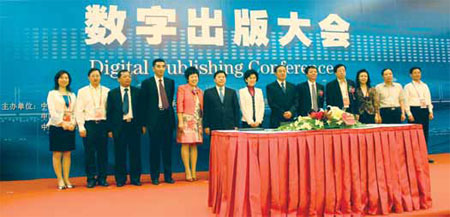E-book publishers talk copyright protection
|
Representatives from online e-book publisher ChineseAll and the British Publishing Technology Group signed a cooperative agreement on an overseas digital library program on May 29 during the Beijing International Fair for Trade in Services. Provided to China Daily |
There is an even more pressing need for copyright protection in the age of digital publications, said Tong Zhilei, chairman and president of online e-book publisher ChineseAll, at a recent forum in Beijing on online copyright protection.
Sponsored by the China Written Works Copyright Society, ChineseAll and Beijing Yonghe International Copyright Exchange Center, the forum was held on April 25 and featured government officials, industry insiders, lawyers and experts.
One of the leaders in the country's digital publication industry, ChineseAll has prioritized copyright protection since its establishment, according to Tong.
The company was founded in 2000 at Beijing's Tsinghua University. Through its partnership with more than 300 domestic publishing companies and more than 20,000 writers, it produces 70,000 to 100,000 volumes of digital publications annually, accounting for 30 to 50 percent of the market share.
ChineseAll's publications can be accessed through such mediums as computers, laptop, mobile phones, PDAs and e-readers. It also offers services to thousands of digital libraries in China.
It was the major founding member of China's online anti-piracy alliance established in 2005.
A recent move of the company is that it has established a nationwide network of lawyers to deal with all kinds of online piracy.
At the forum, Tong said the battle against online piracy needs the joint efforts of legislators, the government and industrial players.
The existing Chinese copyright law is a version that was released in 1991, when online copyright was still an unfamiliar term.
Therefore, it is difficult for the courts and law enforcement bodies to define infringement.
Fortunately, the National Copyright Administration has been working in recent years on an amendment to the law.
The draft was released on March 31 for the solicitation of public opinion.
Tong said he and his colleague will use their rich experience in the field to offer suggestions.
He said the amendment should balance the interests of all parties involved, including the writers, the digital publication companies and end product providers.
He added that an effective mode for sharing the profits among the parties is the key to the balance.
He mentioned the operational mode of Apple, which stirred some controversy recently.
The Apple iPads and iPhones are now popular end products for digital publications.
Another innovative service of Apple is the app stores, where customers can download all kinds of applications, including digital publications.
Apple has a globally uniform profit-sharing system with content providers.
The system runs well in Western countries because of the widely practiced self-discipline of all parties in the value chain.
But it is a different case in China, where some content providers upload works without notifying and paying the original copyright holders.
Admitting Apple's profit-sharing system is something Chinese companies should learn from, Tong suggested that a strict censorship system should be used in the value chain to ensure copyright protection in China.
wangsujuan@chinadaily.com.cn



















